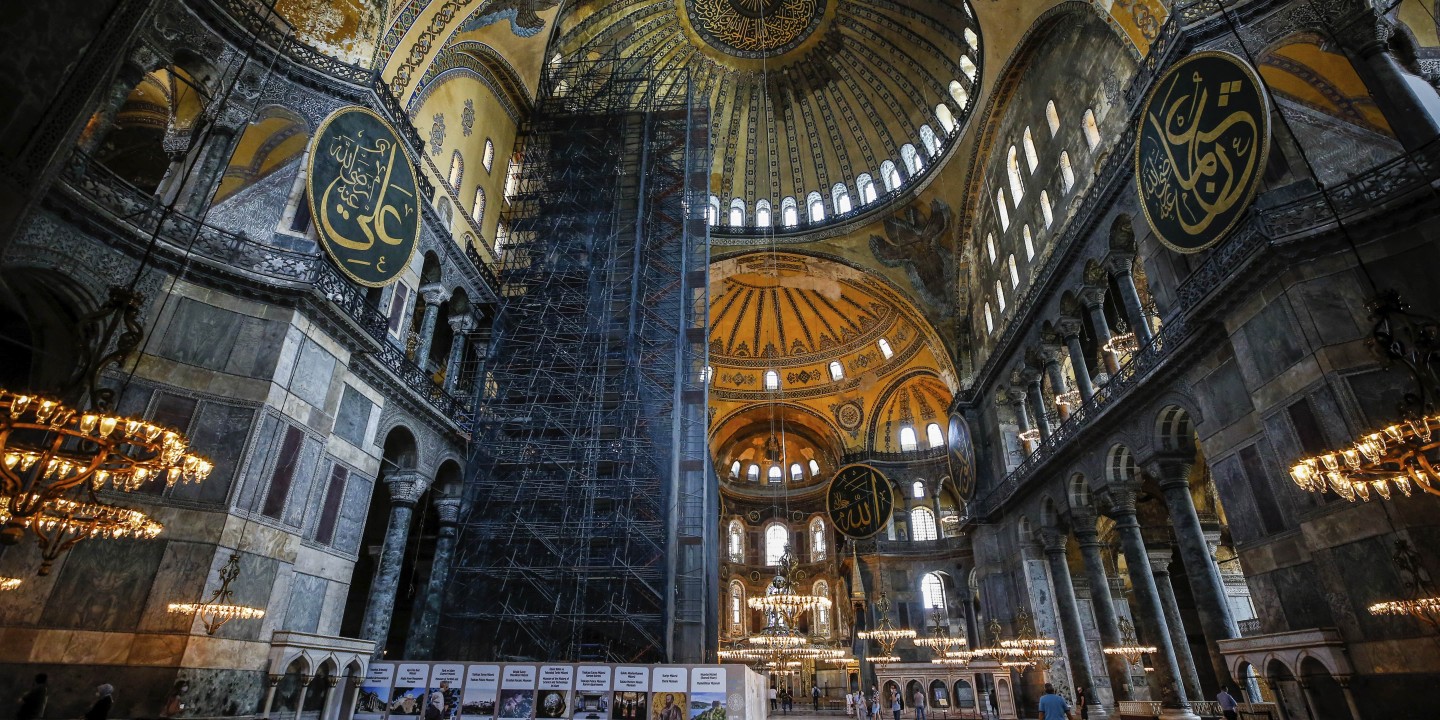Museum or mosque? Turkey debates historic structure’s status

In its more than 1,400-year existence, the majestic domed structure of Hagia Sophia in Istanbul has served as the Byzantine Empire’s main cathedral, as a mosque under the Ottoman Empire, and as a museum in modern Turkey, attracting millions of tourists each year.
The sixth-century building is now at the center of a heated debate between nationalist, conservative, and religious groups who are pressing for it to be converted back into a mosque and those who believe the UNESCO World Heritage site should remain a museum, underscoring Istanbul’s status as a bridge between continents and cultures.
Read our latest issue or browse back issues.
On July 2, the Council of State, Turkey’s highest administrative court, began reviewing a request by a group devoted to reverting Hagia Sophia to a mosque. The group is pressing to annul the 1934 decision that turned the historic structure into a museum.
President Recep Tayyip Erdogan, who leads an Islamic-oriented party, has previously spoken about possibly changing Hagia Sophia’s status to a mosque but has said his government would await the Council of State’s decision.
Analysts believe that Erdogan—a populist, polarizing leader who has frequently blamed Turkey’s secular elites for the country’s problems—is using the Hagia Sophia debate to consolidate his conservative base and to distract attention from Turkey’s substantial economic woes.
Erdogan “feels the pressure of popular support dwindling, and therefore he wants to use issues that he hopes will remobilize his right-wing base around nativist, populist, anti-elitist topics,” said Soner Cagaptay, author of the book Erdogan’s Empire.
Built under Byzantine emperor Justinian, Hagia Sophia was for centuries the main seat of the Eastern Orthodox church, where emperors were crowned amid ornate marble and mosaic decorations.
Islamist groups, however, regard the symbolic structure as a legacy of Ottoman sultan Mehmed the Conqueror and strongly object to its status as a museum. On May 31, the anniversary of the city’s conquest, large crowds gathered outside Hagia Sophia to pray and demand that it be restored as a place of Muslim worship.
In the past few years, Turkey has been allowing readings from the Qur’an inside Hagia Sophia, and Erdogan himself has recited prayers there. At the May 31 observance, he oversaw by video conference the recital of the “prayer of conquest.”
On June 30, Istanbul-based ecumenical patriarch Bartholomew I, considered the spiritual leader of the world’s Orthodox Christians, noted that Hagia Sophia had served as a place of worship for Christians for 900 years and for Muslims for 500 years. He said converting it back into a mosque would “turn millions of Christians across the world against Islam.”
US secretary of state Mike Pompeo also urged Turkey on July 1 to keep Hagia Sophia as a museum to serve as “an exemplar of its commitment to respect faith traditions and diverse history.” He called on the government in Ankara to ensure the structure remains “accessible to all.”
Hours later, Foreign Ministry spokesman Hami Aksoy expressed “bewilderment” at Pompeo’s comments, saying Turkey has been protecting Hagia Sophia’s “historic, cultural and sentimental” values since the conquest.
Greece also strongly objects to attempts to change Hagia Sophia into a mosque, arguing that its designation as a historic monument must be maintained.
“I hope that President Erdogan does not proceed with something that will deeply hurt Turkey,” Greek foreign minister Nikos Dendias said. “This monument has endured many things and it will always return, but Turkey’s image will take a severe blow.”
Turkish media reports say the government was considering the possibility of keeping Hagia Sophia open to tourists even if it were turned into a mosque. That status would be similar to Istanbul’s Blue Mosque, which sits right across from Hagia Sophia and functions both as a house of worship and a tourist attraction. —Associated Press





